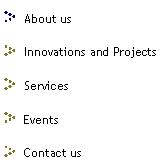|
CENTRE FOR DEVELOPMENT OF APPROPRIATE SOCIAL TECHNOLOGIES |
|
IDEA - INCUBATION - PRODUCTION-SOCIETY |


|
About us |
|
Developments in technology must have a focus towards applications that benefit society at large. There must also be a thrust to develop "appropriate" technology, which aims at empowering the marginalized segment of the population towards better living. Yet, the fact remains that in spite of the tremendous developments in the Engineering sector, the majority of the billion strong Indian community is unable to reap the benefits of this potential available with the leading and strong engineering community of the country. Centre for Development of Appropriate Social Technologies (CAST) is such an Idea Incubation Centre funded by RUSA2.0, Jadavpur University, which provides a forum for the investiture of sustained efforts with active participation of people from different walks of life, including engineering researchers, in the development of applicable technology that is useful for the Indian society. This calls for a different training and a multistep circular approach. a. At the base of this circle, the requirement specifications are to be derived through participatory exercises with the real users in order to ascertain their needs. The developed products have to undergo development cycles based on the received feedback. This forms the basic field survey, continual need assessment and upgradations as well as putting into place a proper networking scheme as the situation demands; primarily based on available resources- human and otherwise. b. The next step is an open "space" where people from various walks and stages of life come together for brainstorming ideas: a) based on the received requirements as also b) innovative notions which find utility in the enabling process. The items in the second set of notions have to pass the need assessment aspect at some stage of development. c. Once a feasible idea is floated, a need based flexible group, composed of researchers from relevant areas, forms to do the implementation and so develops a design. This design takes into account various aspects like the available resources that could be used, aesthetics, ergonomics, costing, variations needed to take into account the different user groups etc. Since these designs are results obtained using a systems approach, rather than any narrow specific approach, these emerge through the interaction of several aspects, including technology, sociology, psychology and economics to mention a few. The development of the Idea Incubation Centre necessitates the involvement of 1. A group of researchers from engineering background of different disciplines to develop suitable technologies in an integrated manner to address the technological needs derived from surveys and assessments. 2. A group of doctors and healthcare personnel to assess the specific needs and guide the developments in the medical domain. 3. A group of social workers and NGOs to assess the specific technological needs and provide feedback for the developments in the social applications domain. 4. A group of enthusiastic young persons, typically students, to conduct local surveys for technological need assessment and also to inculcate ideas and work on them. The subsequent step involves the setting up of a Business Incubation Centre for the ultimate achievement of the goal to go from Concept to Consumer (C2C). The design developed by the researchers must go into the prototyping, criticism, redesigning, design finalization into the product stage. Only then this will go to the basic level for disbursement and criticism, since the course of research and development has to be constantly guided by the field feedback and deployment results. This will thus interact with start ups and existing businesses and industry persons in converting the prototypes of the research outputs into real life products, and so help the society for which is required. |
